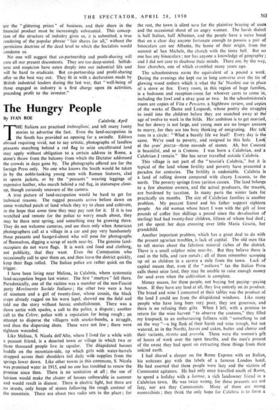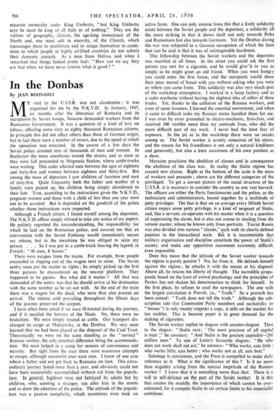The Hungry People
By IVANROE Calabria, April
THE Italians are practised imbroglioni, and tell many funny stories to advertise the fact.. Even the land-occupation in the South has provided an opening for a swindle. Editors abroad requiring vivid, not to say artistic, photographs of landless peasants marching behind a red flag to seize uncultivated land may apply without obligation to, a certain address in Rome, a stone's throw from the balcony from which the Dictator addressed the crowds in days gone by. The photographs offered are for the foreign Press only. No one who knows the South would be taken in by the noble-looking young men with Roman features, clad in sports jackets, or by the " peasants " wearing leggings of expensive leather, who march behind a red flag, in statuesque close- up, though curiously unaware of the camera.
A true picture of land-occupation would be hard to get for technical reasons. The ragged peasants arrive before dawn on some wretched patch of land which they try to clean and cultivate, in the hope that some time they may pay rent for it. If it is too wretched and remote for the police to worry much about, they may be there next spring, and something may be growing there. They do not welcome cameras, and see them only when American photographers call at a village in a car and pay very handsomely those peasants and hangeri-about who will pose for photographs of themselves, digging a• scrap of earth near-by. The genuine land- occupiers do not wave flags. It is work and food and clothing, not publicity, that they want. Even the Communists who occasionally call to spur them on, and then leave the district quickly, keep their flags rolled. The Italian police are rather quick on the trigger.
I have been living near Melissa, in Calabria, where systematic land-occupation began last winter. The first ",martyrs " fell there. Paradoxically, one of the victims was a member of the neo-Fascist party Movimento Sociale Italian° ; the other two were a boy of nineteen and a girl of twenty-four, whose cousin, the black crepe already ragged on his worn lapel, showed me the field and told me the story without heroic embellishment. There was a dawn sortie with spades,. a call to the police, a dispute ; another call to the Celere, police with a reputation for being rough ; an attempt to disperse the villagers with smoke-bombs, a struggle, and then the dispersing shots. These were not few ; there were eighteen wounded.
Like Melissa, S. Nicola dell'Alto, where I lived for a while with a peasant friend, is a deserted town or village in which two or three thousand people live in squalor. The dilapidated houses huddle on the mountain-side, up which girls with water-barrels strapped across their shoulders toil daily with supplies from the springs lower down. Like other towns in this commune, S. Nicola was promised water in 1915, and no one has troubled to renew the promise since then. There is no sanitation at all ; the use of latrines would make the cluster of houses unbearable in summer and would result in disease. There is electric light, but there are no streets, only heaps of stones following the rough contour of the mountain. There are about two radio sets in the place ; for the rest, the town is silent save for the plaintive braying of asse4 and the occasional shout of an angry woman. The harsh dialect is half Italian, half Albanian, and the people have a naive boast that on a clear day anyone fortunate enough to possess a pair of binoculars can see Albania, the home of their origin, from the summit of San Michele, the church with the tinny bell. But no one has any binoculars ; nor has anyone a knowledge of geography ; and I did not care to disabuse their minds. There are, by the way, four churches, one of which crumbled many years ago.
The schoolmistress earns the equivalent of a pound a week. During the evenings she kept me in long converse over the tin of glowing wood embers which is what the Sa' Nicolesi use in place of a stove or fire. Every room, in this region of huge families, is a bedroom and reception-room for whoever cares to come in, including the fowl and a stray goat or two. In the schoolmistress's room are copies of Vita e Pensiero, a highbrow review, and copies of the works of Dante and Leopardi, whose poetry she struggles to instil into the children before they are snatched away at ttiO age of twelve to work in the fields. Her ambition is to get married, but her dowry is not large, and young men are no longer anxious
to marry, for they are too busy thinking of emigrating. Her talk runs in a circle: " What a beastly life we lead! Every day is thi same. We're used to poverty, and resigned to this hole. Look at the gran' piazza—three mounds of stones. Ah, but Cosenza is beautiful, and so is Crotone. I was born a Calabrian, and 'a Calabrian I remain." She has never travelled outside Calabria.
This village is not part of the " tourist's Calabria," but it is typical of the land whose fertility and poverty have presented a paradox for centuries. The fertility is undeniable. Calabria is a land of rolling downs compared with clayey Lucania, to the north. The poverty springs from various causes. The land belongs to a few absentee owners, and the actual producers, the tenants, are burdened by taxation. In many parts the winter lasts for practically six months. The size of Calabrian families is another problem. My peasant friend and his father support eighteen people. An old woman whose heart I won with the gift of four pounds of coffee (ten shillings a pound since the devaluation of sterling) had had twenty-four children, fifteen of whom had died ; yet she spent her days crooning over little Maria Grazia, her grandchild.
Another important problem, which has a great deal to do with the present agrarian troubles,.is lack of capital. The old men like to tell stories about the fabulous mineral riches of the district. There is a small sulphur mine near-by. But they believe there is coal in the hills, and rare metals ; all of them remember scooping up oil as children in a cavern a mile from the town. Lack of capital means that, even if the " outlaws " (as the Italian Press calls them) seize land, they may be unable to raise enough money for seed even when the cultivation is complete.
Money means, for these people, not buying but paying—paying taxes. If they have any land at all, they live entirely on its produce. The bread and wine I consumed at their ta6les was the produce of the land I could see from the dilapidated windows. Like many people who have long been very poor, they are generous, and there is no refusing their gifts. When I left, with a promise to return for the wine harvest " to observe the customs," they filled my knapsack to an embarrassing fullness with " something to eat on the way "—a big flask of their harsh red wine (rough, but not watered, as in the North), loaves and cakes, butter and cheese and their variants, ricotto and provola. These were the women's gift of hours of work over the open hearths, and the men's present of the sweat they had spent on extracting these things from their unkind earth.
I had shared a sleeper on the Rome Express with an Italian, his suitcases gay with the labels of a famous London hotel, He had asserted that these people were lazy and the victims of Communist agitators. He had only once travelled south of Rome, to spend a holiday with a barone, a rich landowner friend in a Calabrian town. He was twice wrong, for these peasants are not lazy, nor are they Communists. Many of them are strong monarchists ; they think the only hope for Calabria is to form a
separate monarchy under King Umberto, " but King Umberto says he must be king of all Italy or of nothing." They are the victims of geography, climate, the age-long insouciance of the North and, one must add in sincerity, of . the Church, which encourages them to proliferate and to resign themselves to condi- tions to which people in highly civilised countries do not submit their domestic animals. As a man from Melissa said when I remarked that things looked pretty bad: " How can we say they are bad when we have never known what is good ? "











































 Previous page
Previous page